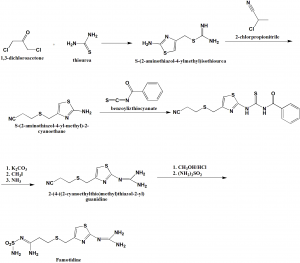FAMOTIDINE Synthesis, SAR, MCQ,Structure,Chemical Properties and Therapeutic Uses
Famotidine
IUPAC nomenclature
3-[({2-[(diaminomethylidene)amino]-1,3-thiazol-4-yl}methyl)sulfanyl]-N-sulfamoylpropanimidamide
Classification
- H2-antihistamine
- Antiulcer drug
Physiochemical Properties
| S. NO. | PHYSICAL AND CHEMICAL PROPERTIES | |
| 1 | Molecular weight | 337.5 g/mol |
| 2 | Physical appearance | White to pale yellow crystals |
| 3 | Melting point | 163.5oC |
| 4 | Solubility | Freely soluble in glacial acetic acid; very slightly soluble in water; insoluble in ethanol |
| 5 | Octanol/water partition coefficient | -0.64 |
| 5 | Presence of ring | Thiazole ring |
| 6 | Number of chiral centers | Not present |
Mechanism of Action
- Famotidine binds with H2 receptors present on the basolateral membrane of the gastric parietal cells.
- This results in blockage of histaminic effects.
- Due to this, there is reduction in gastric acid secretion and thus, reduction in acidity and gastric volume.
Structure Activity Relationship
General structure activity of H2-antihistamines antiulcer drugs can be summarized as:
- Structure of the drug should closely resemble to the structure of histamine.
- Imidazole ring is maintained for affinity at H2 receptor site.
- Substitution at C-4 site helps in H2-selectivity of the drug.
- Sulfur atom increases potency than nitrogen or oxygen atoms.
- Replacement of N-cyanoamino group with nitromethylene increase the potency.
- Guanidines with electron withdrawing groups substitutions have decreased basicity than guanidine.
- Replacement of imidazole ring with other aromatic rings gives other useful products. [1]
Method of synthesis
i. 1,3-dichloroacetone is reacted with 2 molecules of thiourea to get S-(2-aminothiazol-4-yl-methyl)isothiourea.
ii. Reacting the above formed compound with 2-chloropropionitrile produces S-(2-aminothiazol-4-yl-methyl0-2-cyanoethane.
iii. On reacting the last with benzoylizthiocyanate to produce benzoylthiourea derivative.
iv. The last compound undergoes S-methylation by methyliodide followed by cleavage through ammonia to give 3-[[[2-(aminomethyl)amino]-4-thiazolyl]-methyl]thio]ethylcyanide.
v. On methanolysis of nitrile group produces an iminoether which on reaction with sulfonamide produces famotidine.
Medicinal Uses
Famotidine is used for treatment of:
- Stomach ulcers
- Gastroesophageal reflux disease
- Zollinger-Ellison syndrome
- Erosive esophagitis
- Systemic mastocytosis
- Heart burn due to movement of acid from stomach to esophagus
Side Effects
Side effects of Famotidine are:
- Dizziness
- Headache
- Drowsiness
- Diarrhea
- Agitation
- Confusion
- Depression
- Fainting
- Hallucinations
- Trouble urinating
- Blurred vision
- Allergic reactions
MCQs
Q.1 “3-[({2-[(diaminomethylidene)amino]-1,3-thiazol-4-yl}methyl)sulfanyl]-N-sulfamoylpropanimidamide” is the IUPAC nomenclature of which drug?
a) Famotidine
b) Diazepam
c) Buclizine
d) Lansoprazol
Q.2 Melting point of Famotidine is?
a) 220oC
b) 217oC
c) 163.5oC
d) 25oC
Q.3 Match the following with correct classifications of the drugs.
| i. Famotidine | A. Analgesic |
| ii. Codeine | B. ß-blocker |
| iii. Atenolol | C. Anticonvulsant |
| iv. Ethsuximide | D. H2-receptor antihistamine |
a) i-A, ii-D, iii-C, iv-B
b) i-D, ii-C, iii-A, iv-B
c) i-D, ii-A, iii-B, iv-C
d) i-B, ii-D, iii-A, iv-C
Q.4 Mechanism of action of Famotidine includes?
I. Antagonistic effects on H1-receptor.
II. Antagonistic effects on H2-receptor.
III. Inhibition of Hydogen/Potassium pump
IV. Reduction in acidity of stomach
a) I, II
b) II, IV
c) I, II, III
d) III
Q.5 Correct sequence for True and False for the given statements related with the SAR of H2-antihistamines antiulcer drugs can be?
- Structure of the drug should closely resemble to the structure of acetylcholine.
- Pyridine ring is maintained for affinity at H2 receptor site.
- Substitution at C-4 site helps in H2-selectivity of the drug.
- Sulfur atom increases potency than nitrogen or oxygen atoms.
a) TTFT
b) TFTF
c) TTTT
d) FFTT
Q.6 Type of ring present in the structure of Famotidine drug?
a) Thiazole
b) Pyridine
c) Oxazophosphorine
d) Furan
Q.7 The drug Famotidine is mainly used for treatment of?
a) Stomach ulcers
b) Erosive esophagitis
c) Systemic mastocytosis
d) All of the above
Participate in Online FREE GPAT TEST: CLICK HERE
Participate in Online FREE Pharmacist TEST: CLICK HERE
Participate in Online FREE Drug Inspector TEST: CLICK HERE
Participate in CSIR NET JRF Mock Test
ANSWERS
1-a
2-c
3-c
4-b
5-d
6-a
7-d

